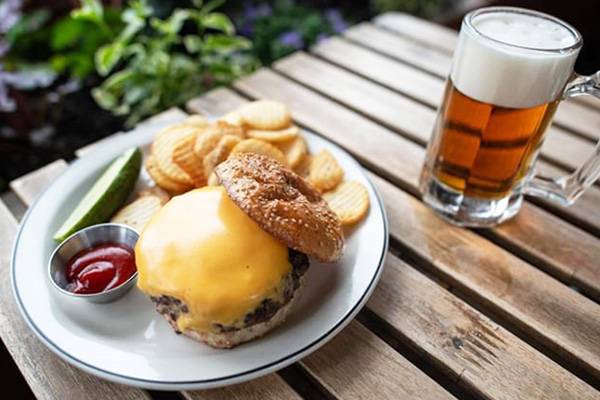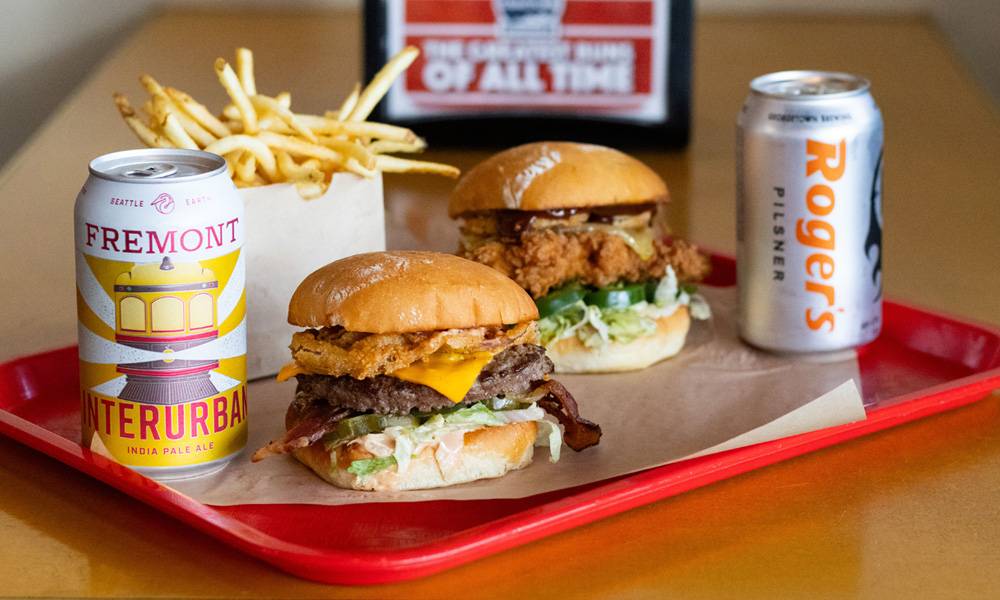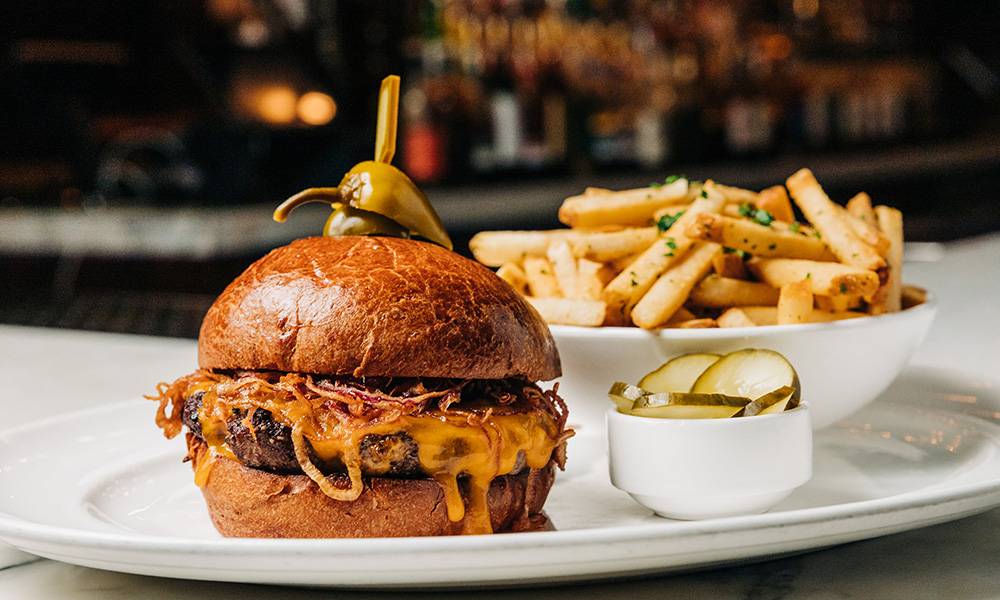All across the map, whether it’s Wisconsin’s indulgent butter burger, Minnesota’s cheese-stuffed Juicy Lucy, or the trendy Oklahoma smashburger, you’ll find shining examples of all-American hamburgers. But no matter how you stack it, the only accessory a burger needs is an ice cold beer.
With grilling season underway and Americans consuming an estimated 50 billion hamburgers annually, we talked with beverage directors at top burger restaurants to see what they’re excited about drinking this summer.

Since opening five years ago, Brooklyn’s Red Hook Tavern (RHT) has become a go-to for its seemingly simple, yet singular burger. Owner Billy Durney had mastered all sorts of meat at his Hometown Bar-B-Que down the street, but not a burger. He perfected that one at Red Hook Tavern, taking cues from the prime beef program at the 137-year-old Peter Luger Steak House in Williamsburg. The dry-aged funk of the RHT burger, a blend of 45-day aged strip and chuck from Pat LaFrieda Meat Purveyors, needs something “clean and crisp, yet hefty enough that it refreshes with each sip,” advises Rafa García Febles, Red Hook Tavern’s general manager/beverage director. The burger, which took eight months of R&D, is deliberately minimalist: two slices of American cheese and a raw onion placed strategically beneath the patty to sop up some of the juice. “We don’t want anything heavy that will make people feel heavier,” explains Febles.
And while wine steals a lot of the attention (they have more than 500 bottles on their list), the beer program is well thought out, revolving mostly around breweries in the five boroughs. “We operate in a great beer city, and similar to the ethos of our wine list, which is thoughtful small producers who are very involved in the process, we highlight that [in beer] where we can,” says Febles.
Part of the beer list is an ode to another NYC landmark, McSorley’s Old Ale House, the quintessential 170-year-old saloon in the East Village that famously pours a “light” and a “dark” beer, indistinctly referenced to by their color rather than category. Red Hook Tavern found a porter brewed on Long Island [the dark] and a British ESB [the light], referred to as “A Tribute to McSorley’s Ale House” on the menu without mentioning specific breweries. But those aren’t necessarily the beers Febles would propose for the burger.
His approach to beer pairing is similar to wine. “Sometimes it’s about contrasting, and since our food tends to be richer, I tend to gravitate to lighter beer,” such as Interboro’s hoppy Bushburg Pilsner from Brooklyn. Febles also recommends a few other borough-based brews, such as KCBC’s Iceberg Zombie, a fruited sour, and Sumac Gose from Back Home Beer, an Iranian-inspired beer soured with tart Persian cherries: “high acid, a little salt, perfect with the food on our menu.” Febles does have a couple more assertive beers on hand, such as Other Half’s Green City IPA, which is reminiscent of a lighter, juicier New England-style rather than a piney West Coast version.
On the other side of the country, at any one of Coastline Burgers’ three Seattle locations (Kirkland, Redmond, West Seattle), owner Aaron Shepherd sticks to a similar philosophy— keeping things local. A quarter pound of pasture-raised NW beef comes with a choice of toppings, including American cheese, crisp iceberg lettuce, red onions, and pickles. Or, you can pick from a menu of bestselling burgers such as The Super Bacon (pepper bacon, buttermilk fried onions) or The Spicy BBQ (fresh jalapeños, pepper jack cheese, fried onion, NW BBQ sauce). All of the burgers are dressed with Coastline’s secret sauce, which Shepherd confesses is his take on Crab Louie dressing that evolved into a “Big Mac” sauce of sorts. All of this sits between a homemade bun that’s something between a chewy ciabatta and sweet brioche that’s “light and fluffy, but has the strength not to fall apart with a juicy burger and all the sauce,” says Shepherd.

Coastline’s beer list is built on familiar provincial and paternal bonds. “My dad loved Rainier, calling it Vitamin R, but it’s no longer a local brew,” so Shepherd looked for other easy-drinking alternatives. Georgetown Brewing’s Manny’s Pale Ale and Roger’s Pilsner are nearby, superlative slightly malty substitutes. The list errs on the lighter side, with pFriem Family Brewers’ Pilsner and GoodLife Brewing Company’s Sweet As! Pacific Ale, but also introduces hoppier beers such as Fremont’s Interurban IPA and Hop Valley Brewing Co.’s Kraken Stash IPA into the mix, with the perfect pairing dependent on how you build your burger. No matter what your order is, Shepherd suggests that on “a hot day you just want to go with something nice and light and refreshing. For cold, crummy Seattle days, something a little heartier. Or Manny’s. It’s for all seasons!”
In Chicago, RPM Steak’s burger and beer pairing is less seasonal than it is tied to its evergreen toppings, or lack thereof. RPM Steak offers up nearly two dozen different cuts of the finest beef sourced from around the globe and also has two vastly different burgers: a Dry-Aged Steakburger and a Wagyu Smash Burger.
Richard Hanauer, partner and wine director of the RPM restaurants, has a two-pronged approach to beer pairing when it comes to burgers. “Initially, it is easy to think the richness [of a dry-aged steakburger] would be elevated by a brown ale—[but] you can’t beat a crisp and cold Pilsner,” professes Hanauer. The subtle saltiness of the burger contrasts the sweetness of the beer, with the carbonation acting “like a steak knife through the meat itself,” he says. “Let the carbonation do the chewing and the bitterness balance the richness of the meat.”

Hanauer pours Outlaw Beer’s Mile Hi Light Lager (brewed by Tivoli Brewing Company in Denver) for its “delicate yet complex layers for such an approachable beer. Especially for a beer categorized as light, it drinks with great intensity,” Hanauer says, marveling at its noticeable yeastiness for such a model lager. The Wagyu Smash Burger is best with Chicago’s own Pipeworks Brewing Co’s Lizard King American Pale Ale, which pairs with specific flavors in the garnishes rather than the meat. The burger is finished with a yuzu kosho (a spicy Japanese citrus/pepper paste) aioli that Haunauer says “screams for Citra hops,” honing in on the tropical touch. Hanauer also attests that the beer is a “textural pleasure with a great body and pronounced crispness,” priming the palate for more by cutting through the fat without washing away the inherent flavor of the burger itself.
Regardless of customs, environs, or condiments, beer is there to make a burger better.
The post Meat & Malt: Beer Makes Burgers Better appeared first on CraftBeer.com.
